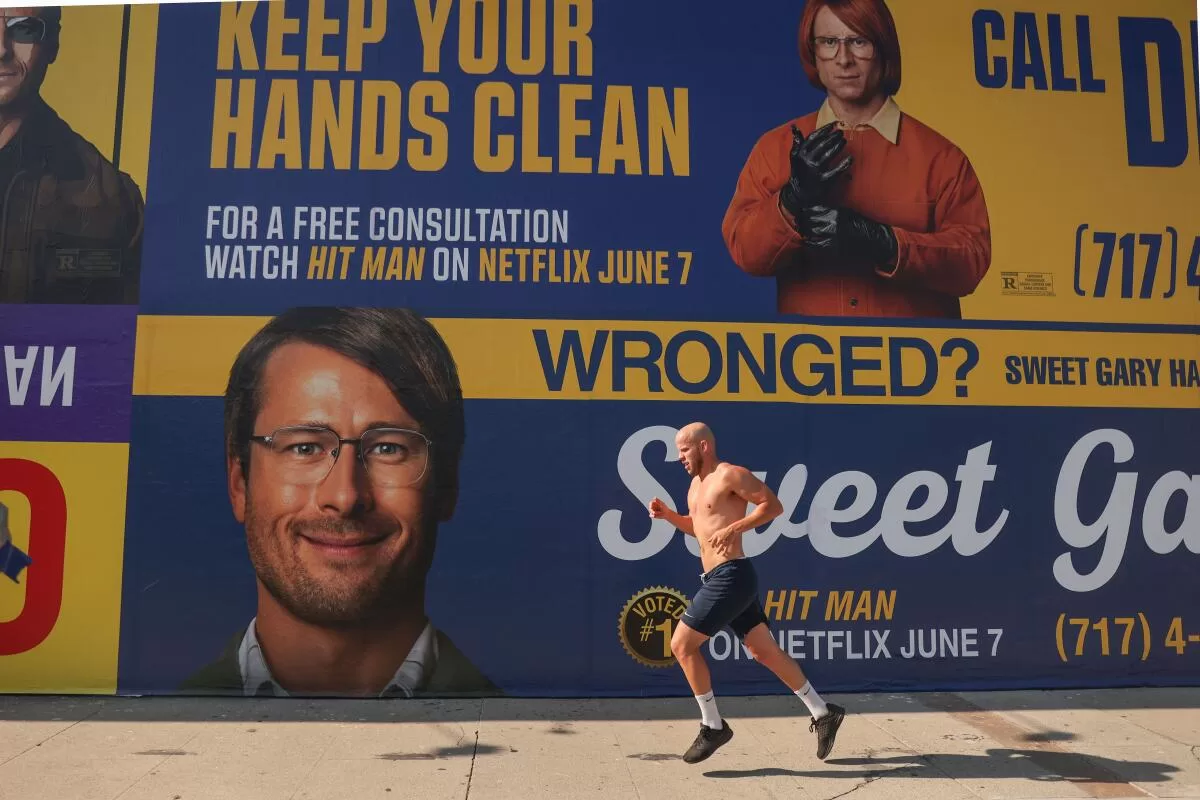As Screen Gab editor Matt Brennan writes in this week’s Catch Up, AMC’s “Interview With the Vampire” — steamy, bloody and expectation-defying — fits the bill perfectly, and in the process creates some of the most compelling relationships currently on television.
Also in Screen Gab No. 136, we recommend two BritBox series to stream this weekend and speak with “Bridgerton” showrunner Jess Brownell about taking the helm for Season 3.
You are reading Screen Gab newsletter
Sign up to get recommendations for the TV shows and streaming movies you can’t miss, plus exclusive interviews with the talent behind your favorite titles, in your inbox every Friday
You may occasionally receive promotional content from the Los Angeles Times.
ICYMI
Must-read stories you might have missed
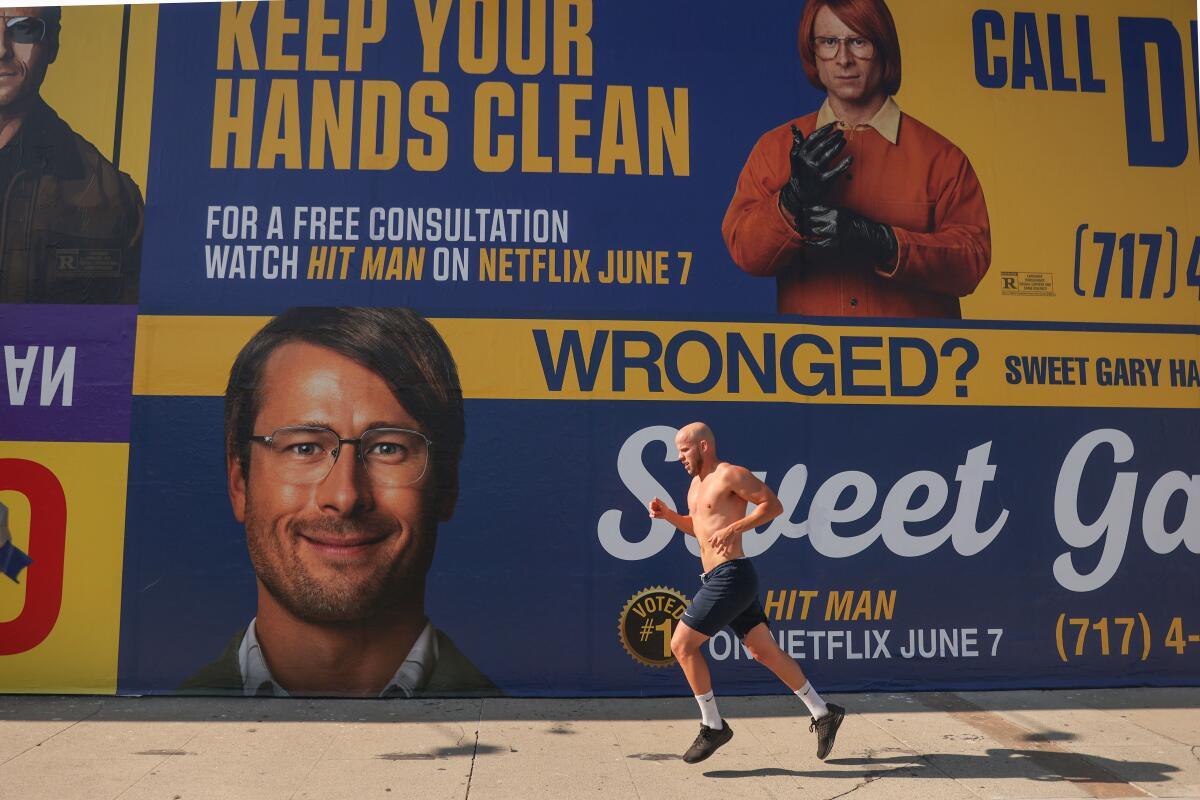
A man jogs by advertisements for Netflix’s new film “Hit Man” inspired by L.A.’s famous lawyer billboards.
(Michael Blackshire/Los Angeles Times)
Need a ‘Hit Man’? Netflix spoofs L.A.’s famous lawyer billboards to market new movie: Forget Call Jacob, Sweet James and Accidentes. Thanks to Netflix’s new marketing campaign, “Hit Man” star Glen Powell is L.A.’s reigning billboard king.
Saying no to Nicole Kidman ‘doesn’t work.’ Just ask ‘Expats’ boss Lulu Wang: This week, Cynthia Nixon stops by to discuss her roles in “And Just Like That …” and “The Gilded Age,” then Lulu Wang joins us to talk about making the leap to TV with “Expats.”
L.A. library users’ 10 most-watched movies and TV shows of 2024 (so far): The streaming service Kanopy, available free to library card holders, let The Times in on the films and TV shows that Angelenos have been watching most in 2024
Why an Academy Museum exhibit came under fire for antisemitism: ‘It felt like a cheap shot’: After igniting controversy over its portrayal of Hollywood’s Jewish pioneers, an exhibit at the Academy Museum of Motion Pictures will be changed, the museum announced Monday.
Turn on
Recommendations from the film and TV experts at The Times
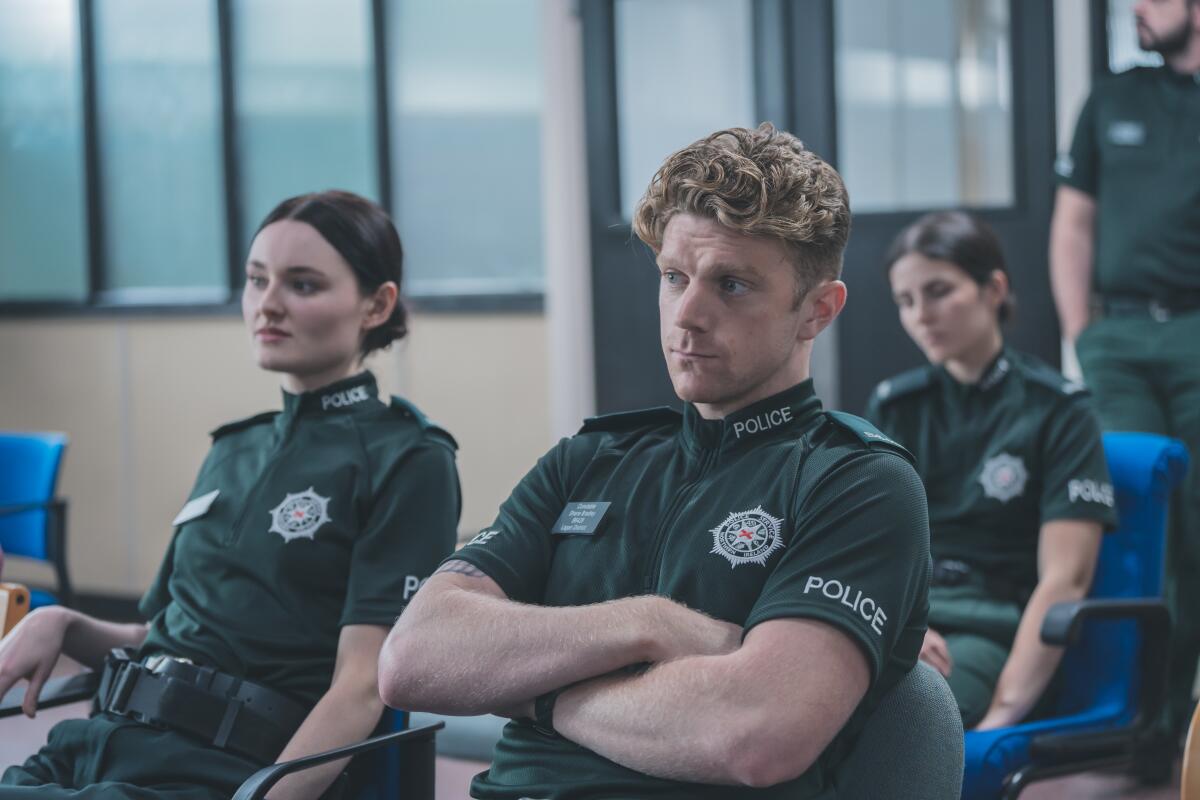
Katherine Devlin and Frank Blake in “Blue Lights.”
(Christopher Barr / BBC / Two Cities)
“Blue Lights” (BritBox)
Season 1 of “Blue Lights” follows a trio of fresh recruits to the Police Service of Northern Ireland, or PSNI, as they adjust to their perilous new jobs. Grace (Siân Brooke), a 40-something pivoting from a career as a social worker, brings a keen emotional intelligence to the job. Annie (Katherine Devlin), a young rookie from a Catholic background, becomes a target of threats. And Tommy (Nathan Braniff) has doubts about his profession but is determined to prove himself. The newbies are guided by a team of seasoned vets, including the charming Gerry (Richard Dormer, of “Game of Thrones” fame) and Stevie (Martin McCann), Grace’s introverted partner (and inevitable love interest).
While it’s not explicitly a show about the Troubles, “Blue Lights” is a sharp examination of a city that remains culturally, politically and economically divided — and what it means to police a community that was, not so long ago, at war with itself. Season 1 revolved around the pursuit of James McIntyre (John Lynch), a former IRA man turned crime boss operating out of a Catholic, nationalist neighborhood in West Belfast.
In Season 2, which began streaming this this week, the focus shifts across town to a loyalist pub in Protestant East Belfast that is a hub for criminal activity, which transcends the political divide. The ambitious six-episode season also explores the city’s heroin epidemic, the impact of government funding cuts and the painful legacy of sectarian violence.
If this makes “Blue Lights” sound like Belfast’s answer to “The Wire,” that’s exactly what journalists-turned-screenwriters Adam Patterson and Declan Lawn had in mind when they created the show, as they recently told me. Like that seminal crime drama, “Blue Lights” has a very authentic sense of place — and doesn’t spoon feed the viewer with tons of exposition. You should have no shame about watching “Blue Lights” with the subtitles on, or keeping your smartphone at the ready to google slang like “peelers,” “touts” and “sneaky beakies.” And even if you don’t understand every reference, the show is full of themes — like workplace romance and mismatched police partners — that require zero translation. —Meredith Blake
READ MORE: ‘Blue Lights,’ a Northern Irish spin on ‘The Wire,’ looks at perils of policing in Belfast
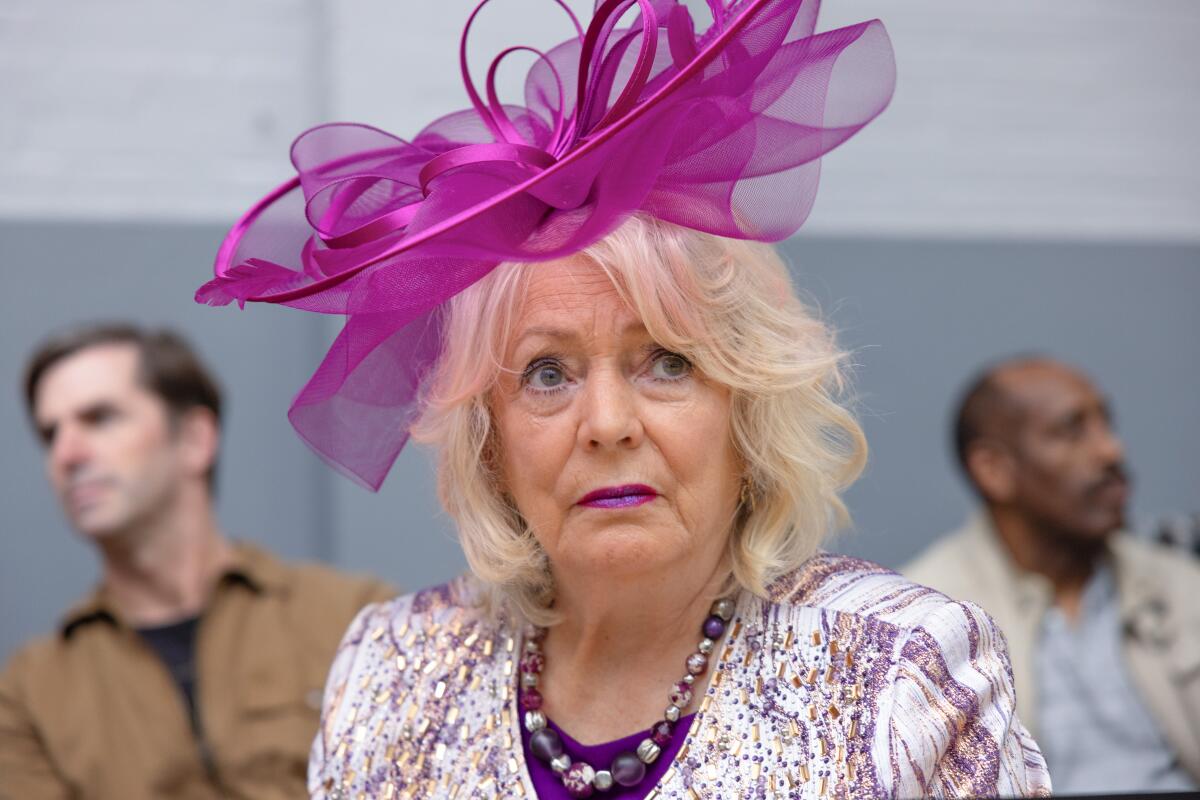
Alison Steadman in “Here We Go.”
(Jonathan Browning)
“Here We Go” (BritBox)
The prospect of a sitcom, or any sort of show at all, co-starring Katherine Parkinson and Alison Steadman would be enough to get me to watch, keep watching and asking, please, for more. Happily this series, whose second season recently slid onto Britbox, is brilliantly funny. It’s a family comedy set in suburban England — not a dysfunctional family so much as a family that can’t get anything to function. Framed as a film project, ostensibly for school, by teenage son Sam (Jack Christou in the first season, Jude Collie in the second, but almost never on camera), it has an improvisatory rhythm, with long takes, at times bringing the entire noisy cast into a single frame. Besides Parkinson as the flailing Rachel and Steadman as her sunny mother-in-law, there are Jim Howick as Rachel’s husband; their children Sam and Amy (Freya Parks); Rachel’s brother Robin (Tom Basden, who created the show) and his sometime fiancée Cherry (Tori Allen-Martin). Nothing goes right for them, unless accidentally, but they’re survivors, and they need one another, as no one else will have them. —Robert Lloyd
Catch up
Everything you need to know about the film or TV series everyone’s talking about
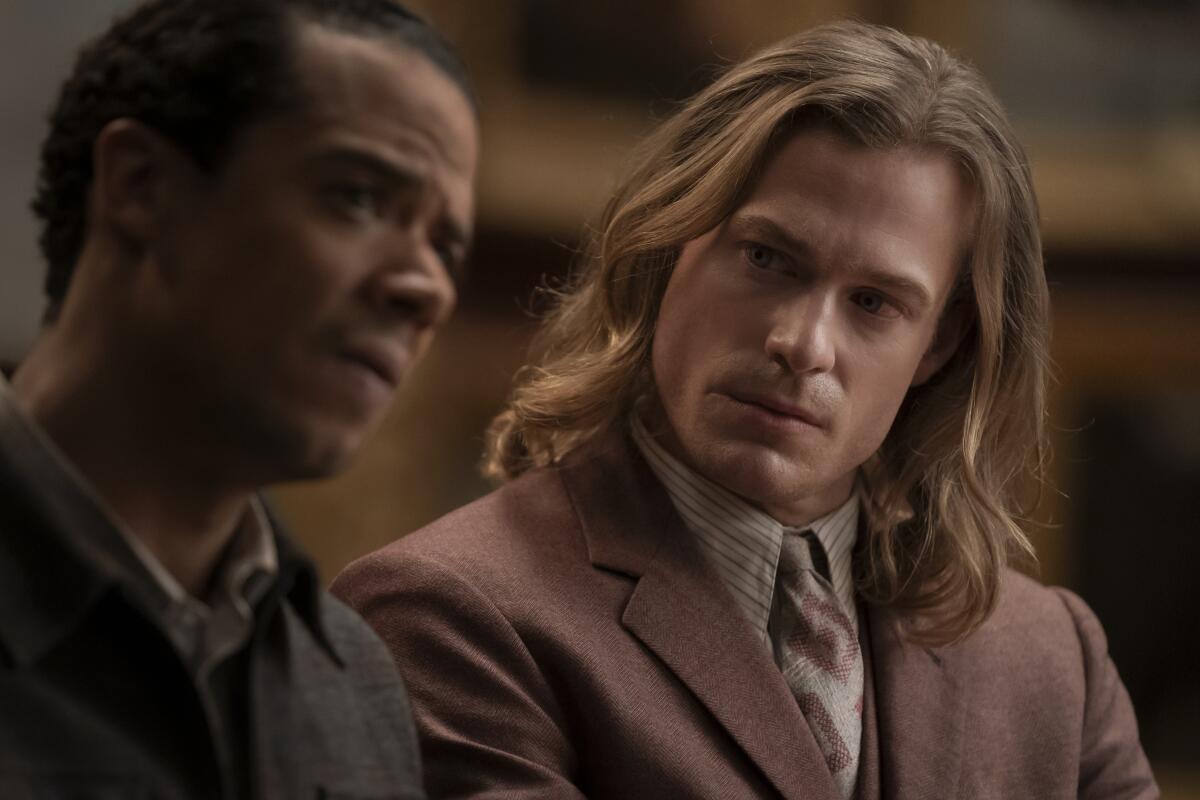
Jacob Anderson, left, and Sam Reid in “Interview With the Vampire.”
(Larry Horricks/AMC)
Early in the second season of “Interview With the Vampire” (AMC, AMC+), the vampire Lestat (Sam Reid) appears at a piano in a Parisian café, a vision — supernatural or schizophrenic — singing to his similarly fanged ex-partner, Louis (Jacob Anderson), about all that he’s missing. “He’ll never run his fingers through your hair the way I do,” he croons, referring to Louis’ new paramour, Armand (Assad Zaman), and for once the conniving antihero of Anne Rice’s “Vampire Chronicles” novels doesn’t dissemble. “Did he break you Louis? Are you broken?” Armand, who’s also known Lestat in the Satanic sense, asks during a lovers’ quarrel later in the episode. “No,” Louis replies, “but I carry him.”
Colored with envy, desire, anger, even humor — at one point the specter of Lestat mocks Louis and Armand’s affections with the same energy as a child saying “Ew! Get a room!” — this very crowded relationship among centuries-old gay vampires is, in its off-kilter way, the best portrait of marriage currently on television, even without the nuptials ever becoming official. (It may also have you mixing up your sexual fantasies and murderous nightmares, but I recognize that’s a niche recommendation.) Upon the groundwork laid by its first season, which used Lestat and Louis’ 30-year-affair and the debauched New Orleans backdrop to explore the honeymoon phase, open relationships, child-rearing and divorce, Season 2 expands the series’ field of vision to include the baggage of bad exes, “defining the relationship,” professional coddling and sexual power dynamics.
All, of course, without naming any of the above as such, which is “Interview With the Vampire’s” foremost advantage. Add 14-year-old vampire Claudia (Delainey Hayles) in the role of adopted sister/daughter and showrunner Rolin Jones’ interpretation of Rice’s fictional universe essentially functions as a family drama with a nation-state-sized budget for red food coloring; that a number of topics it raises have particular valence for same-sex couples is a gratifying bonus. Plus, freed from the shackles of realism, the series’ bold emotional strokes feel comfortably at home. Who hasn’t wanted to cruise for fresh meat in the park after finding out their new boyfriend once dated their ex? Who hasn’t opened up about their traumatic upbringing during a fight with their partner, even if it means pointing out one’s visage in a Renaissance painting? That top-note of the absurd sitting alongside the deeply felt is purposeful, on both my part and, ingeniously, the show’s. It is the leavening agent that makes any long-term relationship work, after all — the spoonful of sugar, as it were, that makes the hemoglobin go down. An acquired taste, perhaps, but one only a series this brilliant could satiate. —Matt Brennan
Guest spot
A weekly chat with actors, writers, directors and more about what they’re working on — and what they’re watching
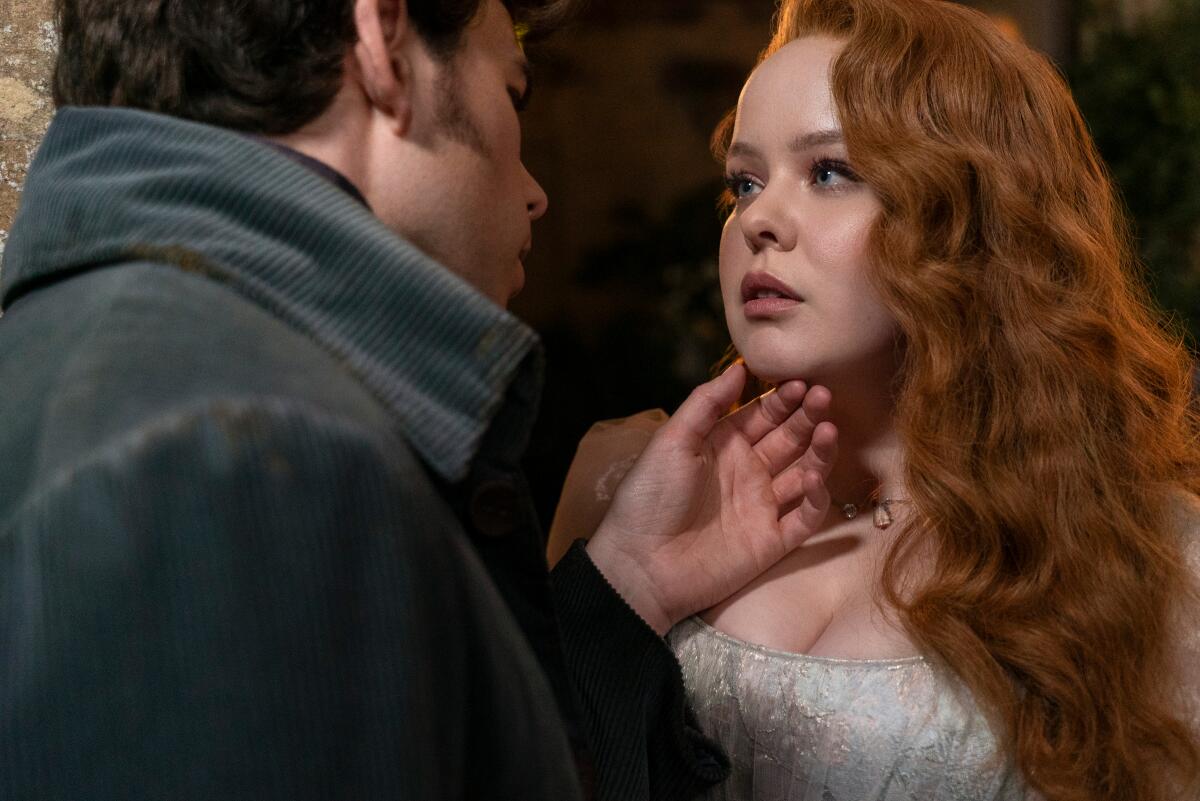
Luke Newton and Nicola Coughlan in “Bridgerton,” Season 3.
(Liam Daniel / Netflix)
Years before she was making tongues wag with a certain NSFW carriage scene on “Bridgerton” (Netflix), Jess Brownell was beginning her TV education at the school of Shondaland, the production company helmed by prolific producer Shonda Rhimes, as a second assistant to Rhimes’ producing partner Betsy Beers. She rose through the ranks, eventually writing for “Scandal” before landing a spot on Netflix’s Regency-era drama. With the exit of series creator Chrs Van Dusen as showrunner, Brownell was tapped to take over — and the pressure is high. The third season shifts its focus to Colin Bridgerton (Luke Newton) and Penelope Featherington (Nicola Coughlan), a fan-favorite couple for many readers of the Julia Quinn novels on which the series is based. Brownell went deep on the season for my recurring feature Running the Show, and also stopped by Screen Gab to discuss the art of angst, the reality competition she got into because of a writer she admires and more. —Yvonne Villarreal
READ MORE: She took over ‘Bridgerton’ as Colin and Penelope moved to the fore: ‘The pressure was immense’
As a student of Shondaland, you’re familiar with the art of angst, the romantic misery that happens on these shows. How did that serve you in the “Bridgerton” world, especially when viewers are really enthusiastic for the “happily ever after” part of it?
That’s something I’ve really learned from Shonda and from working on “Scandal” and “Grey’s Anatomy” — it’s all about the obstacle. In a romantic relationship, if you don’t have a good obstacle, or believable reasons why the couple can’t get together, it’s just not as sexy. It’s not as fun. And the eventual getting together is not as earned. I am someone who would be happy to just watch people being in love for a very long time, but we are trying to appeal to a wider audience. So part of my job is to find those lucky moments that both book readers and fans of the genre can really sink their teeth into, but then also provide a narrative arc and character growth and tension that will appeal to a wider audience as well.
You’ve worked on “Bridgerton” since its beginning. What was your first or maybe most memorable pitch in the room?
We were very collaborative in that room. We would all kind of take a crack at writing on each episode. It’s really a lovely thing that it’s impossible to say who gets credited with what because everyone was involved in shaping it and writing it. I was one of the people who, at one stage, took a pass on the “I burn for you” sex scene. And a lot of what I wrote is in the show and for that scene, and so that’s something I’m very proud of. I also wrote the scene where Simon (Regé-Jean Page) declares his feelings for Daphne (Phoebe Dynevor) to the queen in Season 1, and that’s something I’m really proud of too.
In honor of this season of “Bridgerton,” who is your favorite friends-to-lovers couple in pop culture?
I’m gonna give you the obvious answer, which is “When Harry Met Sally” [VOD, multiple platforms]. I’ve watched it a million times and never get tired of it. I just love Nora Ephron. I know this is a controversial pick, but “You’ve Got Mail” [Apple TV+] when I was growing up, was on television nearly every day. And it was the kind of thing where you just turn on the TV, and there it was. I’ve seen it 100 times. I completely understand how problematic it is that Tom [as Joe Fox] is taking Meg’s [Kathleen Kelly’s] bookstore out of business and tricking her, but I grew up with it. I love it. I can’t help it. And Nora Ephron just gets pacing. And she gets sets and she just knows what she’s doing. And I worship her and I worship that movie.
What’s your go-to “comfort watch,” the film or TV show you return to again and again?
“Survivor” [Paramount+]. I don’t know exactly why, but especially if I’m having a really hard time at work, watching “Survivor” makes me go, “It could be worse. I could be out like having to survive the elements and begging Jeff Probst for rice.” I’ve seen almost every season. I love it. I know this is sacrilege to some people, but I don’t really watch the challenges. I’m only there for the tribal council and I want to know all the politicking and the personalities. You’re one of two people: You either love the challenges or you love the politicking. I love the politicking. I got into it because I’m a huge Mike White fan. “Enlightened” [Max] is one of my all time favorite TV shows. I, of course, just eat “White Lotus” right up. I had run out of Mike White things to watch, and so I started watching the Mike White season of “Survivor.” And it’s honestly the best season of “Survivor.” From there. I just kept going. It’s pretty much always on in the background.
What have you watched recently that you’re recommending to everyone?
I really loved “Mr. & Mrs. Smith” [Amazon Prime]. I thought it was brilliant. I know some people have talked about the first episode maybe being a little bit slow, but I just thought it was so genius. It’s a romantic comedy! This big, high-concept premise is there looming in the background, you know it’s gonna get spicy, but you’re just like watching them adjust together. And I really appreciated how they took time with that first episode and built that vibe and the connection between the main couple. I think it’s absolutely genius.
